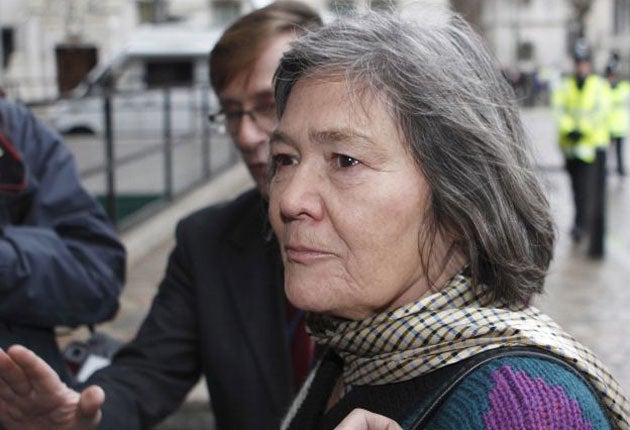Blair deceived Parliament over grounds for war, says Clare Short

Tony Blair deceived Parliament about the grounds for invading Iraq because he believed it was right to go to war, the inquiry into the conflict heard today.
Former Cabinet minister Clare Short accused the ex-prime minister of "leaning on" attorney general Lord Goldsmith to make him mislead the Government about the legality of the March 2003 invasion.
In a stinging attack, she claimed Mr Blair ignored warnings that the military and aid officials were not ready for war because he was "frantic" to support US president George Bush.
Ms Short, who resigned as international development secretary over the conflict, also told the inquiry Gordon Brown was "marginalised" in the weeks before the invasion and feared he would be pushed out of the Cabinet.
She said Mr Brown, who was then chancellor, told her: "Tony Blair is obsessed with his legacy and he thinks he can have a quick war and then a reshuffle."
Then-deputy prime minister John Prescott eventually brought Mr Brown and Mr Blair back together over Iraq, she said in a BBC interview at the weekend.
Over three hours of evidence, Ms Short told the inquiry Mr Blair ignored the Cabinet's views and made the decision to invade Iraq secretly with his "mates".
She said: "I'm not saying he was insincere. I think he was willing to be deceitful about it because he thought it was right."
The Cabinet was not told that Lord Goldsmith expressed doubts about the legality of the conflict, the inquiry heard.
The attorney general provisionally advised Mr Blair in January 2003 that it would be unlawful to invade Iraq without a further United Nations Security Council resolution.
But he changed his mind a month later after being told to talk to senior Bush administration lawyers and Britain's ambassador to the UN, Sir Jeremy Greenstock.
On March 7, 2003, Lord Goldsmith presented Mr Blair with a 13-page legal opinion in which he said a "reasonable case" could be made for attacking Iraq without further Security Council support.
Ten days later he stated without reservation in a short written statement to Parliament that an existing UN resolution provided the necessary authority for the conflict.
Ms Short said the Cabinet would have had second thoughts if it had seen Lord Goldsmith's detailed March 7 advice and heard that the Foreign Office's two senior legal advisers believed there was no legal authority for the war.
She told the inquiry: "I think for the attorney general to come and say there's unequivocal legal authority to go war was misleading."
The former minister also condemned claims that France would veto any UN resolution authorising military action in Iraq as "a deliberate lie".
Lord Goldsmith told the inquiry last week that he did not normally attend Cabinet and was not consulted in the run-up to November 2002, when a key UN resolution was passed requiring Iraq to give up its supposed weapons of mass destruction.
Ms Short cited this as evidence that the attorney general was put under pressure to change his mind.
The former international development secretary said the machinery of Government had "broken down quite badly" under Mr Blair, who appeared before the inquiry last week.
Ms Short said: "I noticed Tony Blair in his evidence to you kept saying, 'I had to decide, I had to decide'. And indeed that's how he behaved. But that is not meant to be our system of Government.
"When you add secrecy and deceit the system becomes positively dangerous."
Ms Short was damning about Mr Blair's failure to ask Washington to delay the invasion so military commanders and humanitarian agencies could be better prepared and to allow weapons inspectors more time to search Iraq for WMD.
She said: "I think he was so frantic to be with America that all that was thrown away.
"If he had done that, his place in history and the UK's role in the world would have been so much more honourable.
"Britain needs to think about this, the special relationship. What do we mean by it?
"Do we mean we have an independent relationship and we say what we think, or do we mean we just abjectly go wherever America goes and that puts us in the big league? That's a tragedy."
Ms Short said the UK had ended up "humiliating" itself and being a "less good friend to America" by slavishly supporting president Bush.
"We have made Iraq more dangerous as well as causing enormous suffering and diminishing our reputation," she told the inquiry.
She also said Britain should re-examine the function of the attorney general, adding: "I think the whole role of the attorney general has proved to be completely unsafe."
Ms Short stood down from the Cabinet on May 12, 2003, nearly eight weeks after the invasion, and resigned the Labour whip in 2006. She now sits as an independent MP.
She was applauded by the audience in the inquiry chamber in central London after finishing her evidence.
Join our commenting forum
Join thought-provoking conversations, follow other Independent readers and see their replies
Comments
Bookmark popover
Removed from bookmarks